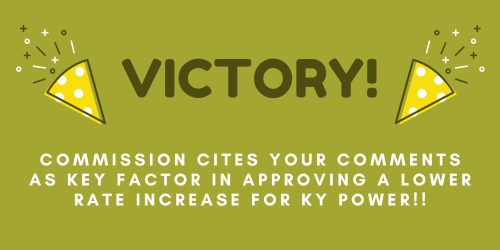PUBLIC COMMENTS NEEDED:
Kentucky Power's
Demand-Side Management Plan
|
Your comments are WORKING!Together, we are holding utilities accountable and keeping electric bills affordable.
The Public Service Commission ruled on the Kentucky Power's most recent rate case. The original request would have increased residential bills by over 18%. The public advocates who intervened in the case came to a settlement agreement with KY Power that would keep rate increases around 11% and provide many new protections for low income customers, including important protections against disconnections. The PSC ruled that the impact of the utility's proposal would be “excessive and disturbing,” based on hearing from so many customers that they could not afford a rate increase. They approved a rate increase lower than the agreed upon settlement, increasing a typical residential customer’s bill 5.66% over current rates. This is a HUGE win! Let's keep up the momentum! Public Comment Needed: Energy Efficiency Programs + Plans (DSM or Demand-Side Management) |
Background:
|
There are two ways to think about meeting customers’ need for electricity: generating and supplying electricity, and demand-side management (ie. reducing the amount of electricity needed). Before we consider building new infrastructure to generate more electricity we should always ensure that a utility is doing everything it can to reduce customers’ need.
When utilities are projecting an increase in future electricity needs their frequent first response is to build new generating capacity in the form of a new power plant or solar installation. This is because the current utility model rewards utility companies for building new power plants. It allows them to charge us for the price tag of the new infrastructure AND allows them to earn a profit or return on investment for that project. This is old thinking and it hurts customers. Building new infrastructure is EXPENSIVE. Demand side management including investing in energy efficiency is always the cheapest way to ensure utilities can meet our electricity needs and therefore it should be given proper weight in the planning process. In the future, we need a utility system that rewards utilities for lowering our bills and saving electricity, but for now we need to make sure that the Public Service Commission is encouraging utilities to prioritize demand side management as an important part of the equation for meeting our current and future needs, and protecting the public interest |
What is Demand-Side Management?from Wikipedia:
What is Energy Efficiency?Energy efficiency measures are programs, products, and tools that help us to lower our energy usage and our energy bills. This includes weatherization and upgrades to our homes and appliances/heating and cooling systems that reduce the amount of energy needed to keep our homes safe and comfortable. |
Kentucky Power recently asked for a huge rate increase (thanks to overwhelming public comment and advocacy efforts the PSC did not approve that full request!) They want US to invest in THEM but what we really need is for KPC to INVEST IN US. Right now, KPC is anticipating building a new gas plant in 2029 and charging us 100s of millions of dollars to build it. But it would be way cheaper to instead invest a portion of that money in energy efficiency and other demand-side management tools and save us from needing to build new infrastructure.
Demand side management (DSM)/ energy efficiency (EE) are almost always the cheapest and most effective way to lower bills, protect homes, and address energy demand.
The programs in KPC's DSM proposal are good, but they are a drop in the bucket for what we really need. Let's tell the Public Service Commission to ensure that Kentucky Power invests in us, helping us save money on our electric bills and reduce the need for future investments in new fossil fuel plants.
See Sample Talking Points for your DSM comment below
Demand side management (DSM)/ energy efficiency (EE) are almost always the cheapest and most effective way to lower bills, protect homes, and address energy demand.
The programs in KPC's DSM proposal are good, but they are a drop in the bucket for what we really need. Let's tell the Public Service Commission to ensure that Kentucky Power invests in us, helping us save money on our electric bills and reduce the need for future investments in new fossil fuel plants.
See Sample Talking Points for your DSM comment below
Share this action with your friends + followers
|
|
|
|
Want to Know More?Watch this short webinar to learn more about how we got here and where we need to go.
|
Tips for Writing Your Comment
The Commission wants to hear how the decisions KPC makes affect your life and your family. You don’t have to be an expert for your input to matter.
Please write your comment in your own words. You are welcome to use the talking points below but try not to copy and paste them word for word. The Commission gives more weight to unique comments over form responses. Don't overthink it. Your comment can be simple.
Please write your comment in your own words. You are welcome to use the talking points below but try not to copy and paste them word for word. The Commission gives more weight to unique comments over form responses. Don't overthink it. Your comment can be simple.
Talking points to inform your comment
Hover over the talking points to see them better
DSM is supposed to offset expensive and risky investments in new generation
- DSM must be treated as a resource instead of an afterthought. DSM and energy efficiency is the most effective and cheapest resource that can minimize investments in new infrastructure.
- We don’t want to spend $300M of our money on a risky 40-year investment in a natural gas plant; its cheaper to invest in hard working Kentuckians and our communities through energy efficiency, smart appliances, and battery storage instead
- Studies show that Virtual Power Plants (VPPs) are 40-60% cheaper than gas peaker plants, and deliver more benefits to ratepayers as well! We need and deserve that
- Utilities can earn a higher return on DSM investments than new generation. KPC has a chance to give their customers exactly what they need most, and make a profit doing it. We must demand that they do that.
DSM makes our communities more reliable and resilient and Kentuckians need energy efficient homes
- Kentuckians are facing high bills and frequent rate increases. Many of our most vulnerable friends and neighbors are having to make tough choices to keep the electricity on each month. Energy efficiency helps keep our electric bills low and our homes warm, safe, and comfortable.
- We don’t have to choose between affordable energy bills and sustainable communities anymore. The answers we need are available, affordable, and shovel ready.
- Energy efficiency reduces the absolute level of load on the energy system, even during extreme weather events (times of peak demand). This makes our energy system more reliable and more resilient (less vulnerable to outages).
- Demand Response can reduce load specifically during peak demand, also making our system more resilient.
- Virtual Power Plants (VPPs) are an important way to meet energy system needs. VPPs are systems of distributed energy resources (including demand response programs) that work together to balance energy supply and demand on a large scale. We need to invest in new technology to be more resilient NOT old, outdated fossil fuel infrastructure.
Our utilities need to be taking DSM seriously.
- That means investing at the rates that other utilities around the country are,the national average is around 2%.
- We need to see at a minimum an investment of 1% or at least half of what they are proposing to spend on new gas plants ($150M)

